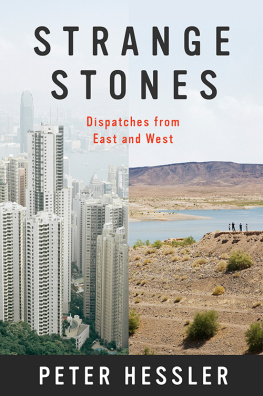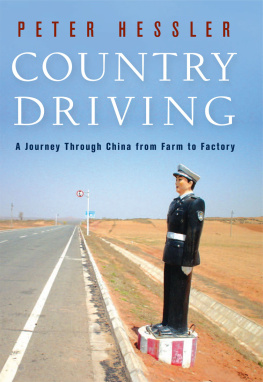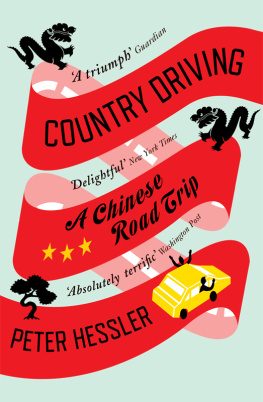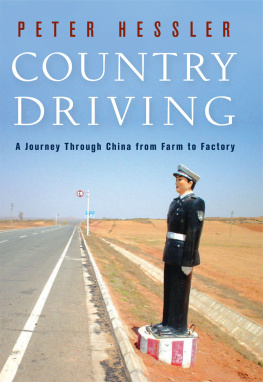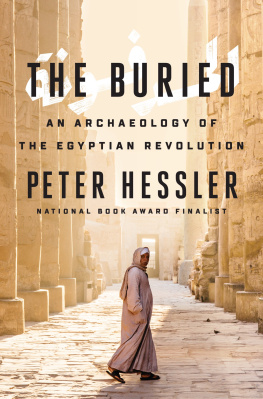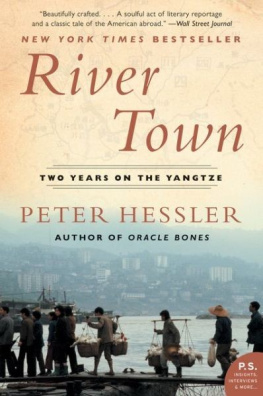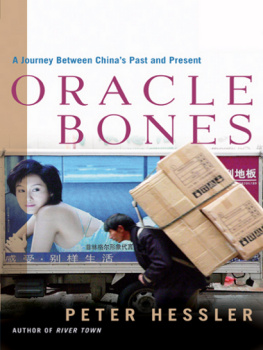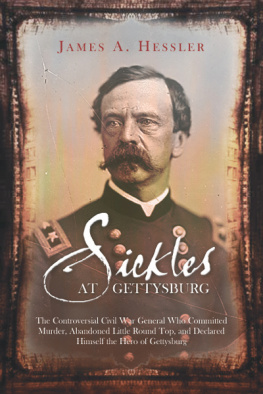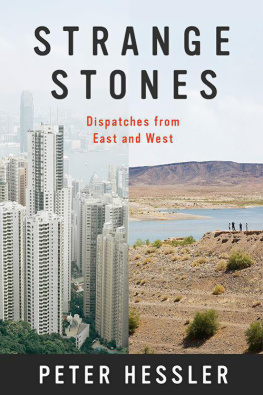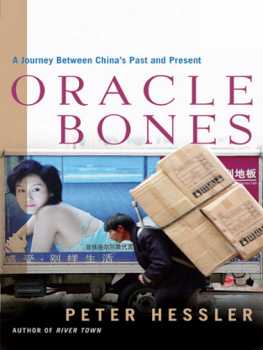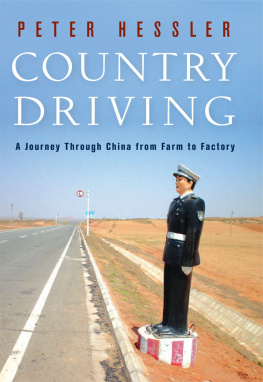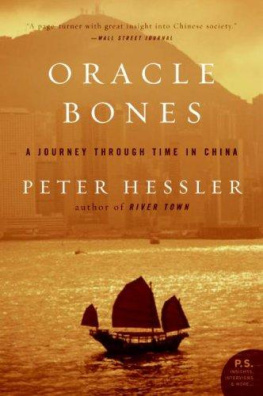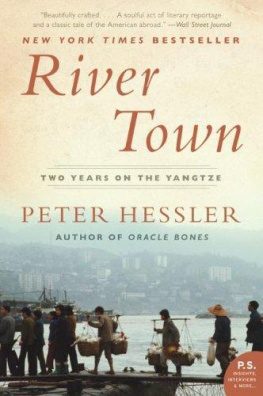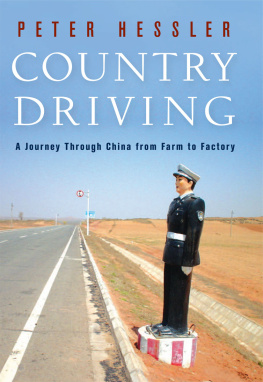Strange Stones
Dispatches from East and West
Peter Hessler

For John McPhee
Contents
W hen I was growing up, my father occasionallybrought his kids along to interviews. He was a medical sociologist at theUniversity of Missouri, and his work took him to places that seemed exotic to meand my sisters: prisons, mental institutions, rural health clinics. Once, he metwith the scion of an extended family that lived in the Mark Twain NationalForest, deep in the Ozarks, where the clan was notorious for exertingheavy-handed control over surrounding hamlets. The old mans name was Elijah,and during the interview he sat next to an open window with a .22 rifle inhis lap, in case a squirrel entered the conversation. He was eighty years old.When my father asked if there was a local drug problem, Elijah nodded seriously.Yes, we do have a drug problem, he said. Theres no drugstore down here. Ifwe need something, we have to drive all the way to Salem.
Elijah mentioned that a while back he had sufferedthroat pain so serious that he had trouble eating even watermelon, the localcrop. Finally he went to a nearby town and saw a veterinarian, who performed aquick examination and diagnosed polyps. Elijah asked him to remove thegrowths.
Im sorry, but Im not a medical doctor, theveterinarian said. I cant do that.
Well, mebbe you cant, Elijah said, and mebbeyou can.
And that was how it wentmaybe nobody made a directthreat, and maybe Elijah didnt leave that office until the surgery wasdone.
My father was endlessly fascinated by the people heinterviewed. Of course he enjoyed talking to the characters and the crazies, buthe also had a deep interest in the quiet ones, the people who went abouteveryday lives with a sense of routine and decency. Missouri was like a foreigncountry to him and my mother. Both of them had grown up in Los Angeles, and theynever expected to spend most of their lives in the Midwest. But they made ittheir home; my father spent years researching health care in rural communities,and my mother, a historian, wrote a dissertation about Jewish immigrants inMissouri.
My father can strike up a conversation withanybody. If a workman comes to the house, my father knows his life story by thetime the project is finished. Once, a plumber repaired our bathroom, and he gotalong so well with my father that they still go deer hunting together innorthern Missouri. During my childhood, if my father and I happened to besitting somewhere with nothing to doa bus station, a hotel lobbyhe would pickout an individual and ask me what I noticed about him. Is there anythinginteresting about the way hes dressed? The way he carries himself? What do youthink he does, why do you think hes here?
He had picked up this activity from his teacher ingraduate school, a sociologist named Peter Kong-ming New. Peter New grew up inShanghai but went to college in the United States; after the Communists tookover in 1949, he stayed in America. He taught my father at the University ofPittsburgh, and then for a couple of years they worked together at Tufts, inBoston. Peter believed that I had been named after him, and although this wasntexclusively truemy parents had other friends and relatives with the samenameit was true enough that they didnt disabuse him of the sense of honor. Hewas an unforgettable presence from my childhood. He stood well over six feettall, with broad shoulders and a big belly. He had a huge bald head and a faceas round as a mooncake. In addition to the way he liked to observe people, hedeveloped a technique that he called creative bumbling. If Peter was in asituation where he needed to get something doneplacate a traffic cop, or get atable at a crowded restauranthe suddenly became a waiguoren , a stranger in a strange land, and invariably people dideverything they could to ease this confused and stuttering Chinaman alongwithout further incident. Peter New had a booming voice, and he loved tellingstories; like my father, he had the rare combination of being both loquaciousand observant. He also had the exiles ability to make himself at home anywhere.That was my first impression of Chinese peopleas a child I assumed they wereall massive, charismatic figures. Whenever I heard the word Shanghai, Ipictured a city of giants.
Many years later, when I came to live in China, Irealized how unusual Peter Kong-ming New really was. It wasnt just his sizeitwas the way he talked, the way he observed. Most Chinese tend to be wary ofstrangers, and there isnt a strong tradition of sociology and anthropology, oftaking an interest in communities that are different from your own. In myexperience, the Chinese arent natural storytellersthey are often deeplymodest, and they dislike being at the center of attention. After I began workingas a journalist, I learned to be patient, because it often took months or evenyears to get a person to talk freely. I remembered my fathers approachif youwant to truly understand somebody, you cant become bored or impatient, and theeveryday matters as much as the exceptional. And there were many moments inChina that called for some creative bumbling on the part of the waiguoren .
D espite these early influences, I didntplan to become a writer in China. Other than Peter New, I had no link to theregion, and in college I never took a course in an Asian subject. My parentswerent the type to guide their childrens careers. My father took me and mysisters to his interviews not because he hoped we would follow in his footsteps,but because he believed that life is more interesting if you can step outside ofyour own world every once in a while. And each sibling was encouraged to followher own interests. Two of my sisters are married to policemen; one of themteaches, like my mother, and the other was a sociology major who is now astay-at-home mom. My third sister is a sedimentary geologist.
For many years I hoped to become a fiction writer.To me, it seemed a higher calling than journalism; I loved the language of greatnovels and the storytellers voice. In college, I majored in creative writing,focusing on short stories, but at the end of my junior year I took a seminar innonfiction that was taught by John McPhee. He was the most exacting teacher Iever hadthe margins of my papers bristled with comments written in a tightleft-handed script. You cant make a silk purse out of this, he wrote next toone bad sentence. When I loaded a phrase with adjectives and clauses, heresponded, This could be said with several pebbles removed from the mouth. Inone profile, I used the subjects name four times in the span of two sentences,and McPhee wrote: Listen to the characters name thudding like horseshoes. Varyit. Use pronouns here and there. He could be blunt: This sort of thing isirritatingly repetitive. Another comment said simply, This is lamecleverness.
But there were also marks of praiseyes or ahor a fine moment. I realized that its possible to write very well and verybadly at the same time, and that the best writers arent necessarily the mostgifted but rather the ones who recognize their weaknesses and work hard toimprove. By the end of the course I understood that nonfiction writing could beevery bit as demanding as the work of a novelist. As time passed, I sensed thatthe routines of a fiction writer felt too internal for me, especially since Ihad a tendency toward shyness. I wanted work that forced me out; I neededcontact with other lives, other worlds. This instinct inspired me to sign up forthe Peace Corps, which sent me to China. But the place itself was almostincidentalall I knew was that if I hoped to become a writer, I should go farfrom home.

